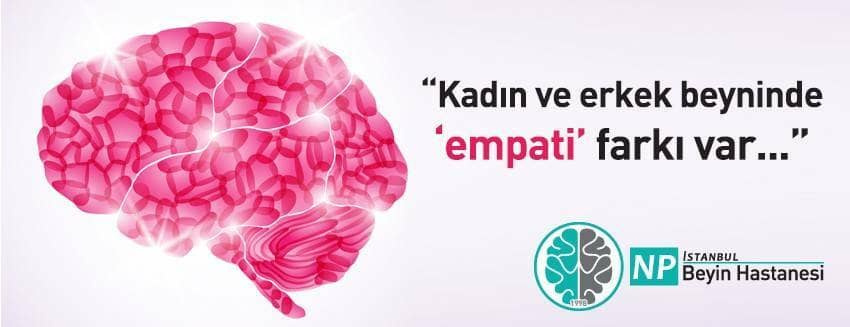
Stating that women and men are different in terms of brain and behavior, Prof. Dr. Sultan Tarlacı points out that while women attach importance to universal compassion, men are based on the concept of justice and honesty.
Stating that women and men have different brain patterns in terms of the ability to empathize, and that women can better understand the feeling of empathy, that is, the pain of another person, Prof. Dr. Sultan Tarlacı says, "If the men who rule the world had a little bit of female brains, the world would probably be a more livable place."
Neurology Specialist Prof. Dr. Sultan Tarlacı from Üsküdar University NPISTANBUL Hospital pointed out that the male and female brain works differently.
Stating that equal opportunities should be offered to people in terms of equality between men and women in general, Prof. Dr. Sultan Tarlacı said that women and men are different in terms of brain and behavior.
Prof. Dr. Sultan Tarlacı said:
"We all know that women are more emotional and men make logical decisions. We can create an imaginary story about this: Ahmet the barber's wife is dying and there is a medicine that can save her life, but it is very expensive. Unfortunately, Ahmet has no money to buy the medicine. He goes to the pharmacy, tells the pharmacist Ayşe about this situation and says "I have no money". What does Ayşe do in this situation? Or, as another question, what should Ahmet the barber do in this situation? Will the pharmacist give her the medicine for free? If not, what would be the path that Ahmet the barber would take? As I read these lines, I can hear everyone creating a scenario, but when we look at it from a gender perspective, the reactions of men and women are different in dilemma situations.
When men are faced with such dilemmas, they make their decisions based on concrete concepts such as stealing or not stealing medicine, saving or not saving lives, valuing property or possessions. Women, on the other hand, think in terms of how the decision will affect the personal and emotional bonds between people. Men and women perceive different voices within themselves in such a conflict.
While women's decisions are motivated by caring for other people, men's behavior is shaped by the concrete concept of justice. The neural brain basis for this is again the ability to empathize. In general, women in all cultures do not take part in violent activities such as war and hunting (all warrior soldiers were men in history, not counting the Amazon women warriors mentioned by Homer and Hesiodos, who lived in the Temiskira region of Samsun's present-day Terme district and the Temiskira region at that time), while they work patiently in more selfless jobs such as child and patient care."
Women empathize with both good and bad people
Prof. Dr. Sultan Tarlacı stated that while women give importance to universal compassion, men are based on the concept of justice and honesty and said, "This is a fact of the difference in empathy in male and female brains. A woman can punish a dishonest person, but she can also share his pain. A man punishes him without sharing his pain. In this sense, it may be objectionable for women to be soldiers or law enforcers because of their high emotional empathy. However, it is not difficult for a woman who accepts the difference from the beginning to make an evaluation like a man."
Men empathize only with good people
Prof. Dr. Sultan Tarlacı stated that scientists have investigated how there is a difference in brain functioning between seeing good people in pain and seeing bad people in pain:
"It has been found that when women are confronted with such a situation, that is, when they see both the good man and the bad man in pain, the same areas in their brains (anterior cingulate and insular brain region) work brightly. Another expression of this is this: Women showed strong empathy for both the good and the bad guy. In men, a quite different brain state was found. When men saw good people suffering, their brains were found to work in the areas of suffering, meaning that they empathized with the good person who was suffering. In contrast, when the men saw the bad guys suffering, no work was observed in the areas of their brains that felt someone else's pain. The pain-sensing areas in the brains of men who saw the suffering of men deemed to be bad were silent. Unlike women, men did not seem to care about the fate of the bad guys. What's more, there were regions of the brain's reward system that were activated, indicating that men enjoyed the punishment of dishonest villains. The simple conclusion is that men and women have different brain patterns in terms of their ability to empathize, and that women are better able to understand empathy, that is, the pain of another person."
Why is military service a male profession?
"Perhaps this is why men become soldiers in wars," said Prof. Dr. Sultan Tarlacı and concluded his words as follows:
"The fact that it is impossible for a man to share the pain of an enemy in his brain can make him a good hero. On the other hand, high empathy for good friends or group members is an emotion that ignites the group and maintains unity. For a man who sees deaths on the enemy front, this is easy to bear, while on his own front it is painful. This pain will fuel the natural desire for revenge. The situation is different for women. Even the pain of their opponent creates a shared pain in them. Women also become soldiers, but they are likely to be subjected to more intense and painful emotions in doing so. The sharp black-white, us-versus-them distinction that emerges in men can be a bit hazy in women."
